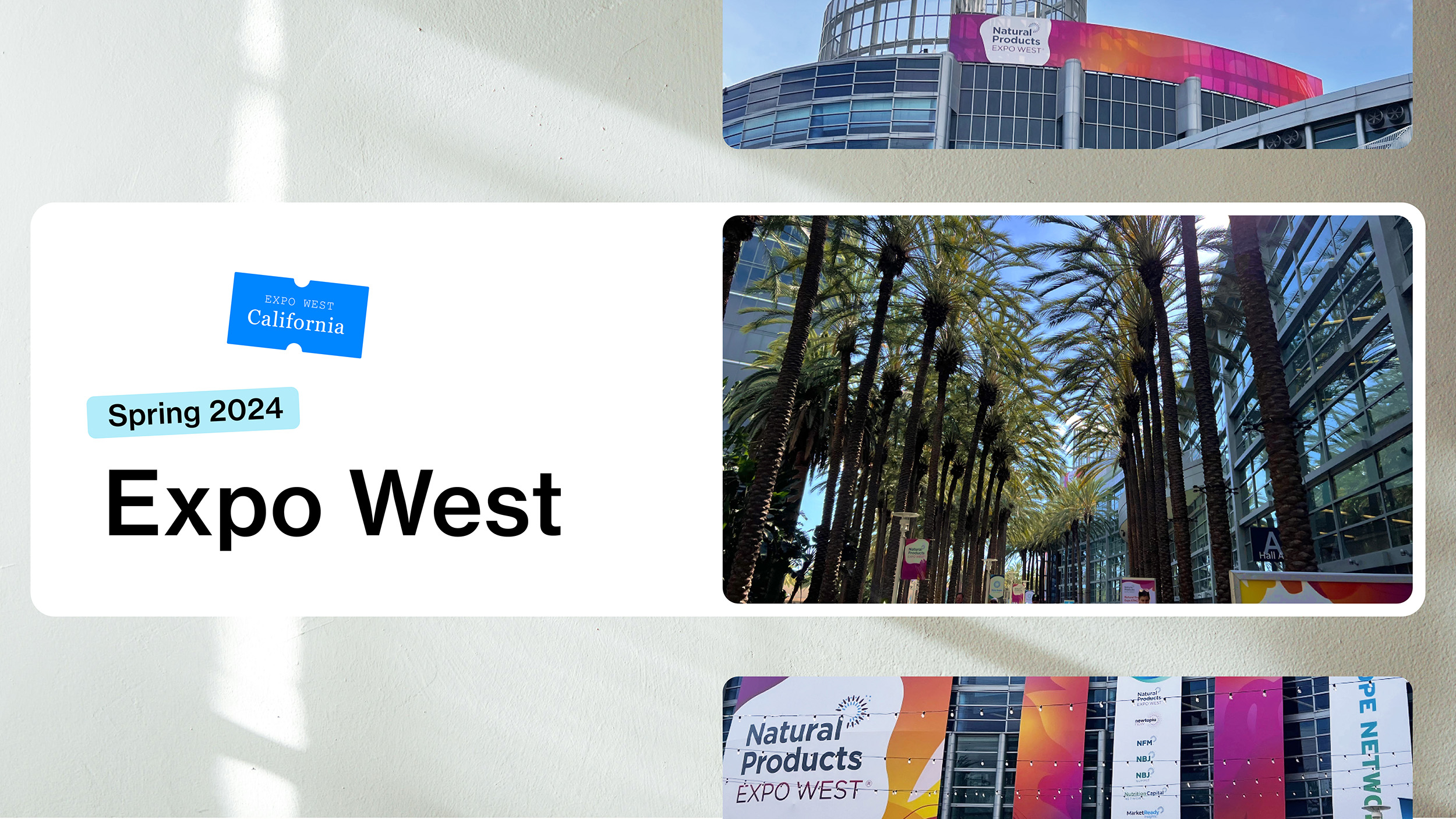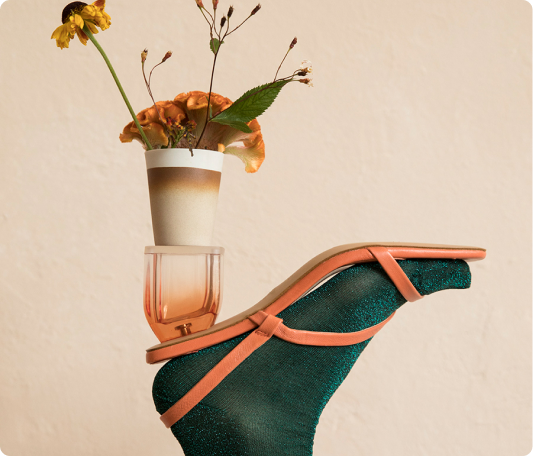Trend, Tradeshow Recaps, Industry Insights and more!

Twelve intrepid team members from The Barcode Group joined 65,000 other attendees exploring more than 3,000 brands at Expo West 2024.
This is one of the most important shows for us to attend each year, particularly for the food and beverage categories, and this year did not disappoint. It’s so chock full of bright, beautiful energy and innovation, it’s difficult to get through in a few short days. But Team TBG put on our comfortable shoes, covered almost 1 million square feet of exhibition space and spent time discovering promising new brands, connecting with our vendor partners and meeting with our buyers from Target, Walmart, Costco, Sam’s Club, Amazon and more.
Here are our predictions for what we’ll be seeing on tables, on plates and in homes across America in 2024:
From Reel bamboo paper towels to Safe Catch trout filets, if you’re introducing a new CPG product it’s got to have sustainable credibility. We spotted amped up organic salad kits from Revol Greens and plant-based reusable Zero Ware bowls from World Centric.
Companies are reducing plastics and chemicals or eliminating plastic altogether, like Babo Botanicals with their milk carton-esque shampoo and conditioner containers. Refillable and concentrated personal care and beauty products also appear to be more common.
“The New Ideas tent showcased emerging brands and had reusable sampling cups they were testing,” said Ashley Garofalo, vice president of sales. “Instead of throwing away little plastic sample cups, you tossed your metal cup into a special bin that team members would then wash and be able to reuse. It was so smart!”
At least 78 percent of American consumers report a sustainable lifestyle is important to them. And consumers, particularly younger customers, are willing to shift their spending to products with environmental, social and governance (ESG) claims. This is a space experiencing steady, sustained growth and brands and retailers not paying attention are already far behind the curve.
Oat milk, vegan bacon, chickpea crisps and lentil chili cups are only scratching the surface of the plant-based products we saw (and tasted). Le Grand Mac and Cheeze squeezable sauce pouches make it easy to DIY ooey, gooey dairy-free macaroni and cheese to enjoy next to an Alessia avocado “burger.” There were plenty of familiar foods that received plant-based makeovers, but we were particularly delighted by the imaginative use of plant products in unexpected ways.
Avafina Organics created a luxurious tin of plant-based chiaviar – chia seeds, seaweed and other surprising ingredients that looked like a dead ringer for caviar. And Umami Industries took tots to a new level with lentil and quinoa. Alternative milks of every provenance were around nearly every corner.
Only a small percentage – between one and three percent – of Americans report being vegan. But when you add to that the number of vegetarians, flexitarians, lactose-intolerant and people just wanting to make a few meals and snacks better for themselves and the planet, it’s obvious why the plant-based food market is expected to grow to more than $160 billion by 2030.
But it’s not just foods that are being crafted from plants, everything from shampoo to skincare, home cleaners to home decor is growing from the roots up, including out-of-the-box products like Sparkle Innovations plant-based feminine hygiene pads.
Regenerative agriculture might sound like the latest sustainability buzzword, but it’s actually an ancient practice: Protect the health of the soil, maximize crop diversity, protect crops year-round and bring in livestock for strategic grazing. Regen ag promotes biodiversity, water and soil health and can even help capture atmosphere-harming carbon.
Alec’s Ice Cream is a great example of a brand that has earned attention for being a product made from regenerative-verified ingredients. Regenerative agriculture has such promise that none other than the King Arthur Baking Company legacy brand now has a regeneratively-grown whole wheat flour they refer to as a “climate blend.”
In 2022, the regenerative agriculture market size was approximately $8.5 billion. In just 10 years, it is expected to surpass $18 billion.
Americans waste billions of pounds of food every year, so it was exciting to see creative brands thinking outside of the waste bin and giving new life to foods people may not have looked at otherwise.
Country Archer utilizes wild game and organ meat in their snack sticks while Wunder Kern provides an apricot seed milk alternative. Prime Roots creates plant-based deli meat substitutes from fermented mycelium while Fabalish makes mayo from discarded chickpea water (aquafaba). We may never look at sea moss the same way again.
Asian foods have enjoyed renewed popularity over the past several years and there was no shortage of Korean kimbap and Vietnamese coffee at Expo West. This year, however, it was a delight to see other, less commonly celebrated world flavors take center stage.
A Dozen Cousins packs Afro-Caribbean flavors into its beans, rice and sauces. Simpli created a Peruvian spice and salt blend, Brutal lupin bean puff snacks feature an ingredient native to Ecuador and Better Sour packs Latin American guava, Filipino calamansi and Chinese ume into sour gummy candies.
You can also expect to see a deluge of dumplings hitting freezer sections, everything that can be put into a dumpling will likely be put into a dumpling this year.
Prebiotic tea, super greens, probiotic yogurt, fermented kimchi shots – all products maintaining the balance between food, beverage and supplements. In fact, judging solely by the prevalent supplement options at Expo West, Americans would like assistance with focus, calm and anxiety.
And, because everyone wants to be told it’s okay to have a snack – good for you, even – permissible indulgence continues to be in the spotlight. Have some almonds, they’re probiotic. Chocolate sweetened only with fruit can be better for you. More than one dozen brands at the show featured the word “Good” in their name.
Our team joked that the Expo West meme this year was, “Does it have stevia in it?” due to the many snacks, sips and sweets utilizing the alternative sweetener.
Whether it’s for Dry January or forever, non-alcoholic options are fresh. From aperitifs to sangria, the growth of NA beverages is one to watch.
From Reel bamboo paper towels to Safe Catch trout filets, if you’re introducing a new CPG product it’s got to have sustainable credibility. We spotted amped up organic salad kits from Revol Greens and plant-based reusable Zero Ware bowls from World Centric.
Companies are reducing plastics and chemicals or eliminating plastic altogether, like Babo Botanicals with their milk carton-esque shampoo and conditioner containers. Refillable and concentrated personal care and beauty products also appear to be more common.
“The New Ideas tent showcased emerging brands and had reusable sampling cups they were testing,” said Ashley Garofalo, vice president of sales. “Instead of throwing away little plastic sample cups, you tossed your metal cup into a special bin that team members would then wash and be able to reuse. It was so smart!”
At least 78 percent of American consumers report a sustainable lifestyle is important to them. And consumers, particularly younger customers, are willing to shift their spending to products with environmental, social and governance (ESG) claims. This is a space experiencing steady, sustained growth and brands and retailers not paying attention are already far behind the curve.

We’re constantly gaining industry knowledge: from tips and tricks to back end data, we got crazy amounts of knowledge ready to share with you.
Get access